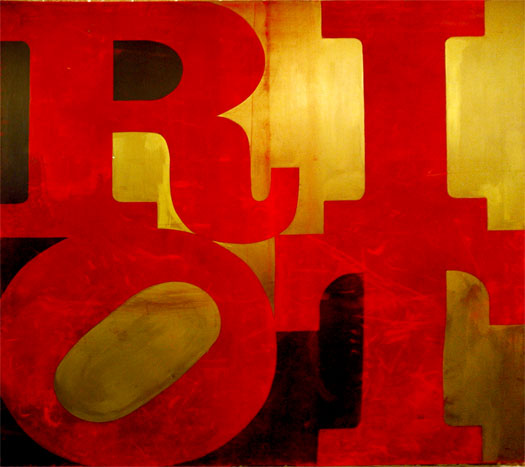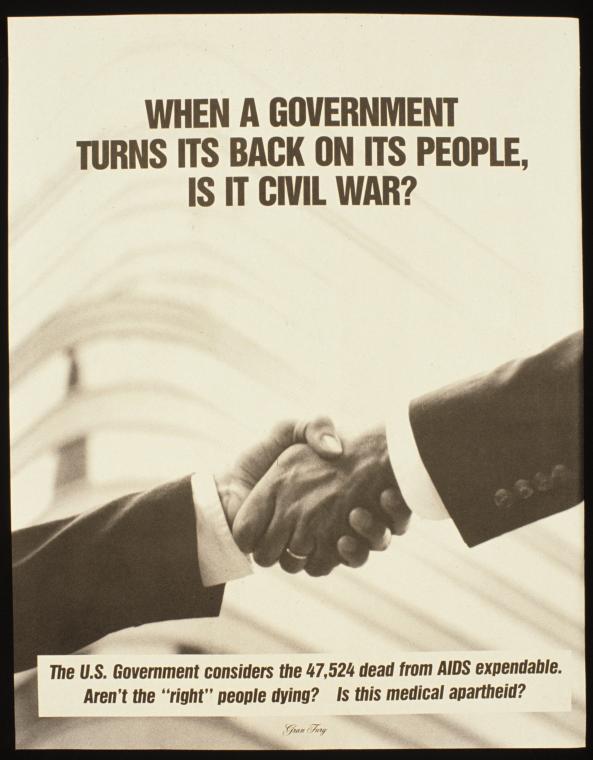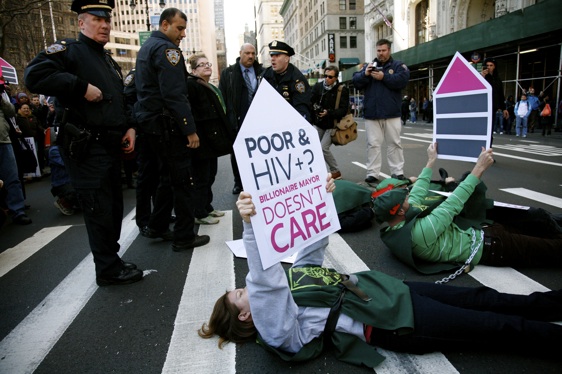The opening today of a retrospective of the work of radical art collective Gran Fury during the AIDS crisis is timely and suggestive of what Occupy needs to learn from ACT UP. ACT UP’s first action in 1987 was a die-in in Wall Street. Gran Fury produced a mock newspaper called The New York Crimes, prefiguring the Occupied Wall Street Journal. ACT UP demanded change from the government but also change from its audience, whether men or women, gay or straight (to use the dominant terms of the 1980s). ACT UP operated an extensive direct democracy in its process, centered on the use of affinity groups. From the start, though, they had very specific demands in relation to the treatment of people with AIDS.
It’s easy to forget now how terrifying the disease was in the 1980s. The first person I knew with it, Mark, was diagnosed in London in 1986. He was active, out and activist but very soon caught the previously rare pneumonia, pneumocystis carinii, that killed so many early AIDS patients. He was dead within the week. The funeral was terrible, with hundreds of young friends and activists shut outside at the wishes of his Catholic family. It was not until 1996 that the “cocktail” seemed to offer a way to live with AIDS, at least for those with access to health care and the expensive pharmaceuticals.
In the midst of the AIDS crisis, Gran Fury expressed the anger and the militancy that came from so much mourning. I’d forgotten this one, though:
In the current exhibition, the poster is landscape and takes up an entire wall at the 80 WSE gallery. It’s really worth getting over there just to see this, although the whole show needs to be seen. The question seems to want to be answered “hell, yes” all over again, in a different context. In the news today, it emerged that Freddie Mac, the government’s own mortgage guarantee company, has been buying billions of dollars of complicated derivatives that bet against people being able to refinance their mortgage. Is debt to Occupy what AIDS was to ACT UP?
The two subjects, in classic Occupy fashion, need not to be separated but brought together. On December 8, 2011, World AIDS day, Housing Works and OWS staged a Robin Hood action on Wall Street.
Housing Works details why the slogan “Poor and HIV? Billionaire Mayor Doesn’t Care” has bite:
Mayor Bloomberg has cut more than $10 million for HIV/AIDS housing and services during the past year, plus an additional $3 million more in his November Financial Plan, while opposing the state 30% rent cap affordable housing legislation that would prevent homelessness for thousands of people living with HIV/AIDS.
The Global Fund to Fight AIDS, TB and Malaria just announced that it would not make new grants during the next two years due to broken pledges by donor governments.
Bond holders, of course, must be made “whole,” meaning get every penny back and so the pennies have to come from people with AIDS and other diseases.
It’s often said that ACT UP was able to motivate activism because people were literally dying. They’re still dying. What ACT UP did was make visible the connections of “greed and indifference” to those deaths. As the British queer activist Bea Campbell has pointed out this week, feminism (and ACT UP was distinctly feminist, I would argue) was at once about “recognition” and “redistribution.” Debt causes death. Time for (another) riot.




Alex, I totally share your sense of need and there’s all kinds of anxieties that circulate about gender/sexual orientation at Occupy. Tavia Nyong’o has a great post on this: http://bullybloggers.wordpress.com/2012/01/21/occupying-gender-in-the-singular-plural/
I also agree that for all the media fake concern about us being dormant or over, this is a really important stage of learning, discussion and interaction: ACT UP’s history shows us that it’s what happens over a decade that counts.
Nick, I am glad to see you making this connection, but I feel like it is equally informative and important for us to draw distinctions between movements and their historical moments so that we can improve our current efforts. In a blog post of my own, I have written about my (worried) thoughts about feminism and OLA, but this matter of the role of dying also seems critical. Yes, people with AIDS are still dying, as are others who lack health care and coverage. But the American AIDS activist movement, like most movements here over the last twenty years, was ultimately quieted because of multiple distancing and assuaging mechanisms that put this death (and other severe lived consequences related to greed) at at least one degree of remove for most of the movement. Only activists can can clear the place of such obfuscations. It is invigorating to watch Occupy begin to make these clear links for people.